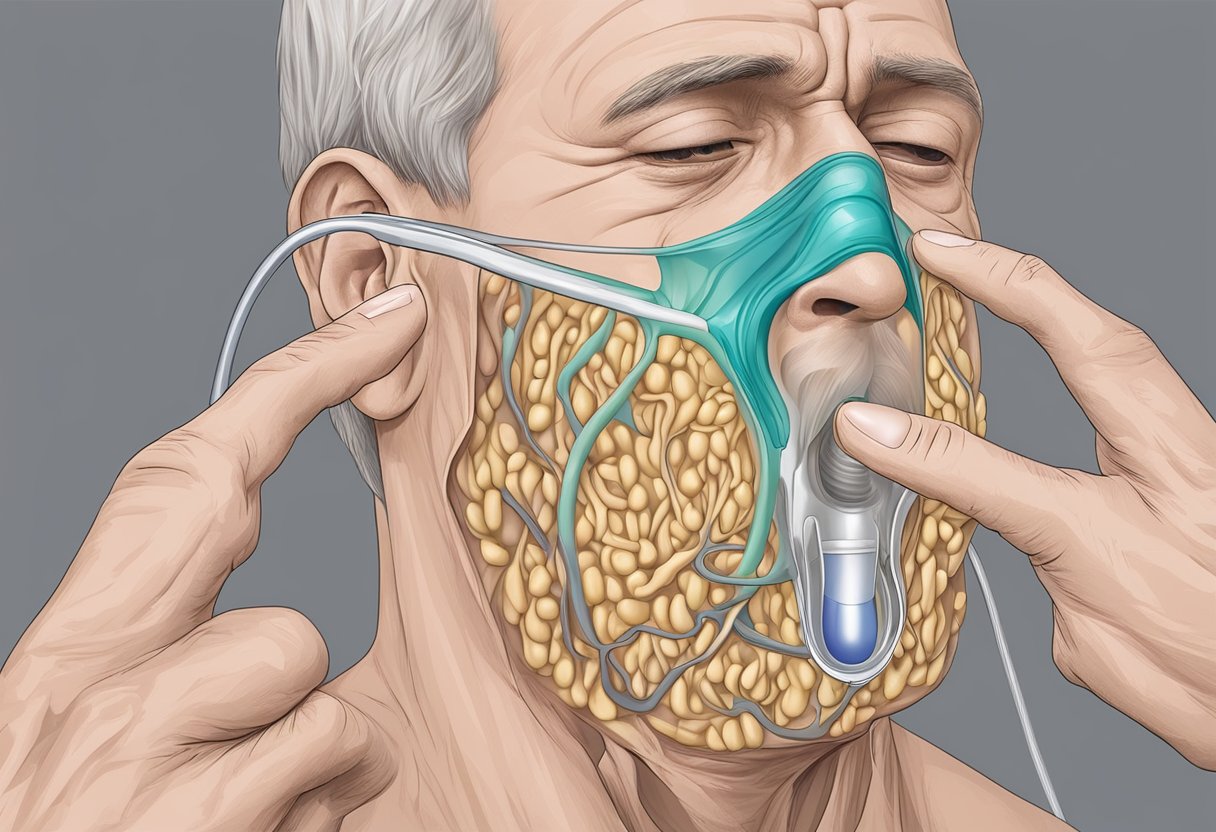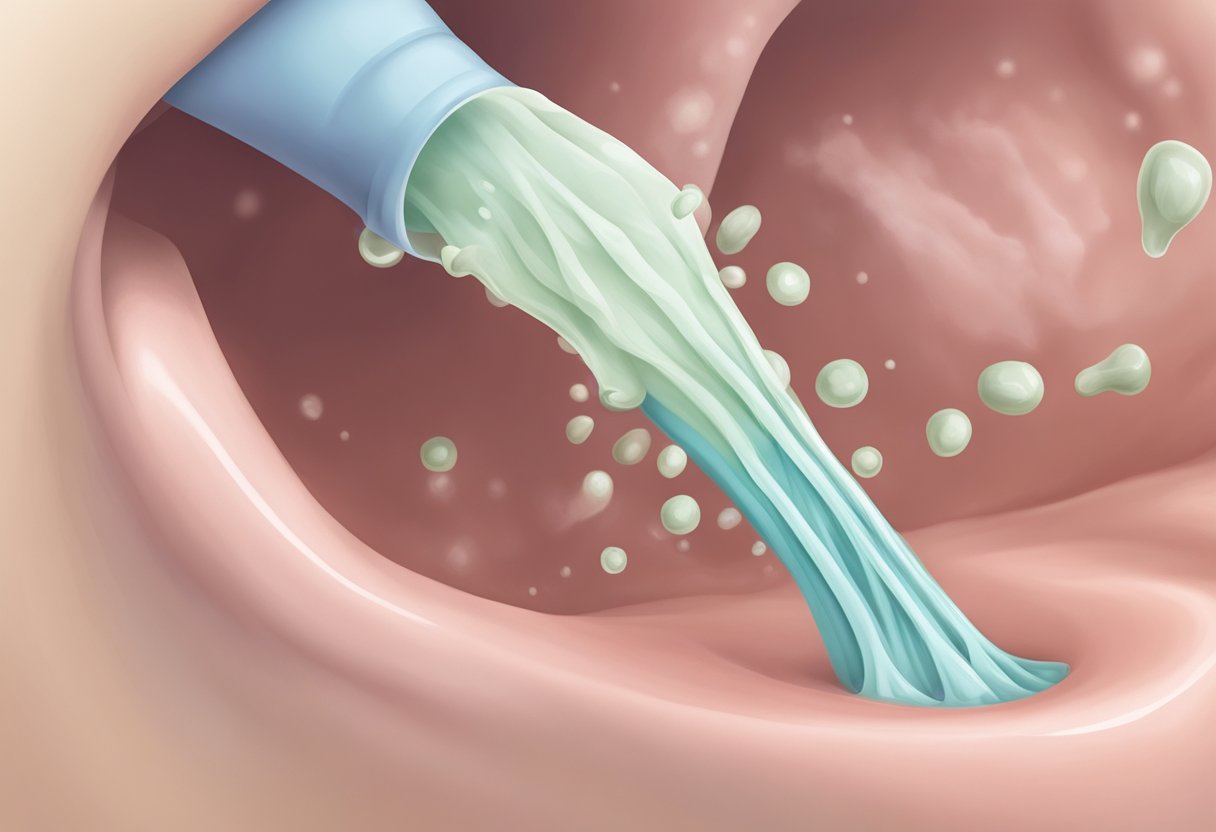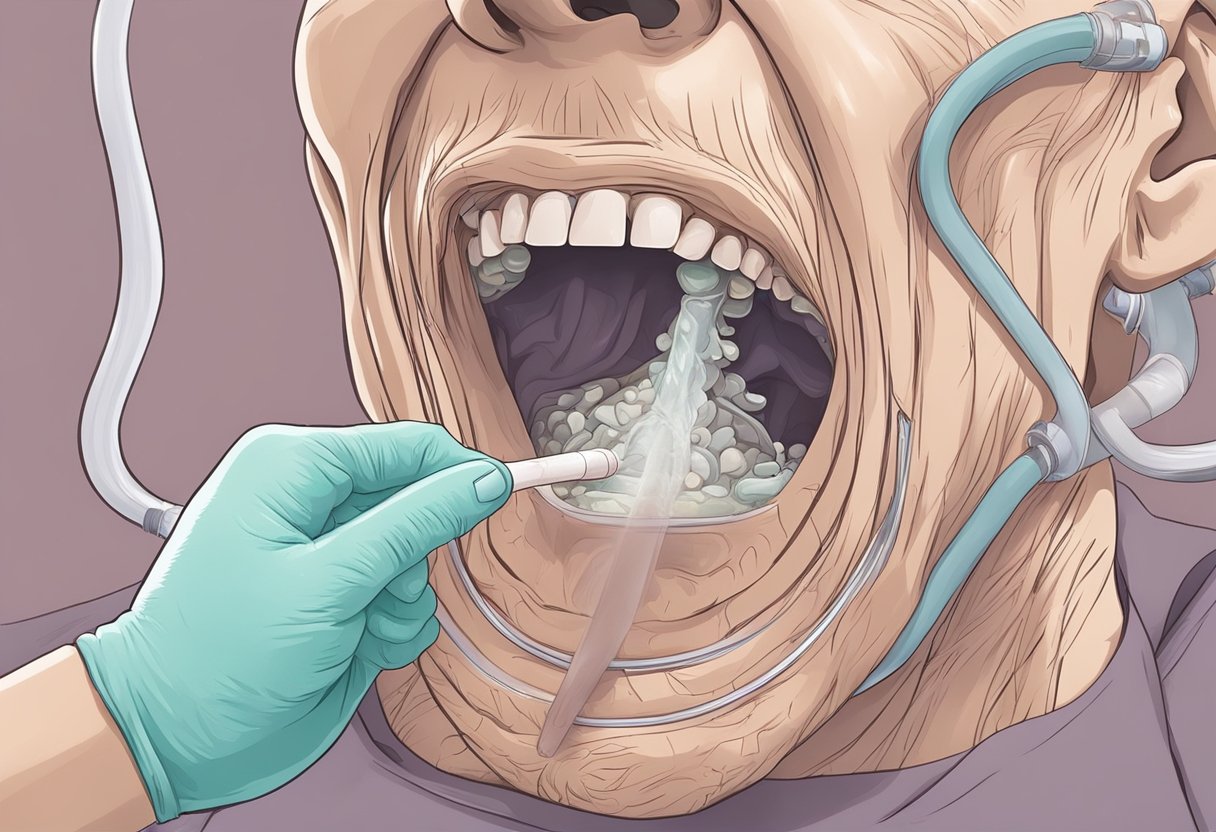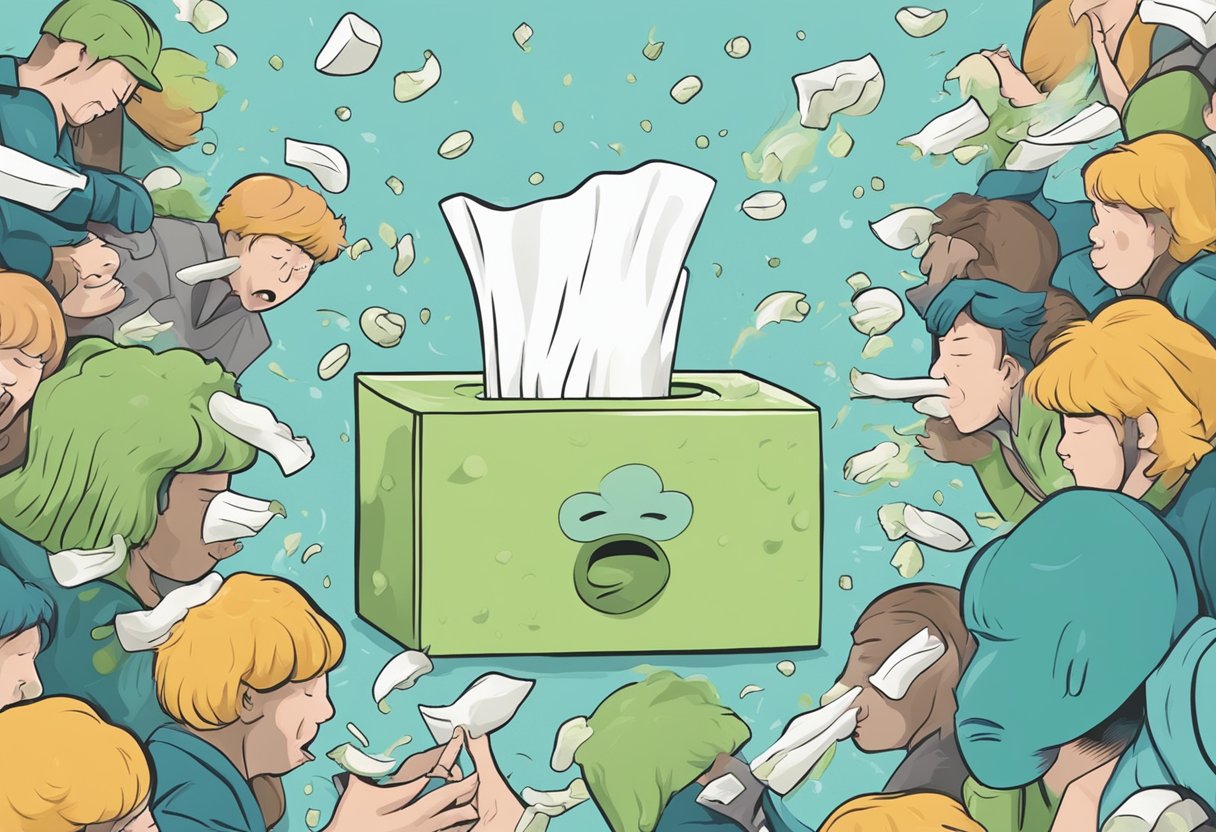Manage excessive mucus production with proven strategies and understand the underlying causes in our comprehensive guide.
Table of Contents
Introduction – Excessive Mucus:
Excessive mucus production can be more than just a nuisance; it often signals something is amiss with the respiratory system. Mucus itself serves as a protective lining for the airways, trapping dust, microbes, and allergens and helping to prevent infection. However, when the body produces too much mucus, it can lead to discomfort and coughing and may indicate underlying health issues that require attention. It’s important to distinguish between mucus and phlegm, as these terms are often incorrectly used interchangeably.

The reasons for excessive mucus production vary, ranging from temporary conditions like a cold or allergies to more serious chronic disorders such as COPD or cystic fibrosis. Recognizing the symptoms and understanding the potential complications is crucial for managing the condition effectively. Symptoms often include a persistent cough, a feeling of mucus buildup in the throat, or difficulty breathing. Excessive mucus can lead to infections and worsened respiratory function if left untreated.
Treatment and management strategies for excessive mucus can involve over-the-counter medications, home remedies such as hydration and humidifiers, and sometimes prescribed medications to address underlying causes. Identifying and treating the root cause, rather than just alleviating symptoms, is vital for long-term relief.
Key Takeaways
- Excessive mucus may point to various health conditions, and understanding its causes is key to effective treatment.
- Symptoms include a consistent cough and a sensation of throat congestion, which can escalate if not properly managed.
- Treatments range from simple home remedies to medications that target underlying health issues.
Understanding Mucus

Mucus is a slippery secretion produced by the goblet cells in the mucous membranes lining respiratory and digestive tracts. Composed mainly of water, proteins, antibodies, and the glycoprotein known as mucin, its primary function is to trap and eliminate foreign particles, like bacteria and dust, from the airway.
In normal conditions, mucus production is a continuous and necessary process for protecting and moisturizing the linings of these tracts. Problems arise, however, when there is excess mucus, which can lead to a feeling of congestion or a nagging cough. The causes of overproduction can vary from infections, such as the common cold, to allergies and chronic conditions like asthma or COPD.
| Key Findings | Sources |
|---|---|
| Allergies can lead to excess mucus production | Healthline |
| Mucus is vital for trapping unwanted particles | Cleveland Clinic |
Excess mucus can sometimes indicate an underlying health condition that may require medical attention. The quantity, consistency, and color of the mucus can signal different issues. For instance, thicker, discolored mucus may suggest an infection.
Effective management of excess mucus includes staying hydrated, using a humidifier, and sometimes taking medications to address the underlying cause. Understanding one’s body and being aware of changes in mucus production can be a gauge for one’s respiratory health.
| Related Terms |
|---|
| Hydration |
| Humidifier |
| Medication |
Causes of Excessive Mucus

Excessive mucus production can compromise one’s comfort and health, stemming from various underlying causes that affect the respiratory system.
Infections and Diseases
Infections like the flu, bacterial pneumonia, and bronchitis can escalate mucus production as the body attempts to expel the invading pathogens. Chronic conditions, such as asthma, chronic obstructive pulmonary disease (COPD), and cystic fibrosis, increase mucus as the airways become inflamed and narrowed.
Allergic Reactions
Allergies commonly cause mucus overproduction when the immune system responds to allergens like pollen, dust mites, and pet dander. This immune response often leads to sinusitis and inflammation, which are characterized by congestion and increased mucus.
Environmental Factors
Environmental irritants, including cigarette smoke and pollution, can produce excess mucus by irritating the airways. Inhaling these irritants can cause the mucus to thicken and lead to congestion, making it more difficult to clear the airways.
| Key Entities | Relevance | Source |
|---|---|---|
| Infections (Flu, Pneumonia) | High | Verywell Health |
| Chronic Diseases (COPD, Asthma) | High | Healthline |
| Allergies (Pollen, Dust Mites) | High | Cleveland Clinic |
| Environmental Irritants (Smoke, Pollution) | High | Medical News Today |
| Key Findings | Related Keywords |
|---|---|
| Infections can cause increased mucus production | Flu, Pneumonia, Infection |
| Chronic diseases often lead to excess mucus | Chronic Obstructive Pulmonary Disease, Asthma, Cystic Fibrosis |
| Allergic reactions trigger mucus overproduction | Allergies, Allergic Reactions, Allergens |
| Environmental factors aggravate mucus secretion | Pollution, Cigarette Smoke, Irritants |
Symptoms and Complications

Excessive mucus production often leads to various symptoms that can vary in intensity. Individuals may experience persistent coughing as the body attempts to clear the mucus from the lungs. This cough may be dry or may produce phlegm, which can be clear, yellow, or green in color. Sore throat and throat irritation are common as mucus drips down from the nasal passages, a condition known as postnasal drip.
The accumulation of mucus can also cause a sensation of congestion in the nose and sinuses, leading to difficulty breathing and shortness of breath. Additionally, individuals might report headaches, often due to the pressure buildup in the sinuses.
| Key Symptoms | Sources |
|---|---|
| Cough, Phlegm, Sore Throat, Sinus Congestion | Verywell Health |
| Shortness of Breath, Throat Irritation, Postnasal Drip | Healthline |
If not addressed, excessive mucus can lead to several complications. A blocked airway can decrease oxygen levels, increasing the risk of infections like bronchitis or pneumonia. Repeatedly clearing the throat or severe coughing can aggravate the linings of the throat and chest, causing additional discomfort or injury.
| Complications | Sources |
|---|---|
| Infections (e.g., Bronchitis, Pneumonia), Chest Injury | Cleveland Clinic |
Observing these symptoms closely is essential, and consider consulting a healthcare provider if they persist or worsen. Diagnostic tests may be necessary to determine the cause of excessive mucus and to prevent further complications.
Treatment and Management

Managing excessive mucus effectively involves pharmacological interventions and supportive home care strategies. These approaches aim to alleviate symptoms like a runny nose or fever and address underlying health conditions like acid reflux or emphysema that can exacerbate mucus production.
Medications and Remedies
Prescription medications and over-the-counter remedies play a crucial role in treating excessive mucus. For adults and children with conditions like chronic bronchitis or emphysema, a doctor may prescribe:
- Expectorants: Medications such as guaifenesin to help thin mucus.
- Mucolytics: Including dornase alfa, which break down the structure of mucus molecules.
- Antibiotics: Used only if a bacterial infection is the cause of mucus overproduction.
- Antihistamines: To relieve mucus caused by allergic reactions.
- Decongestants relieve nasal congestion but should be used cautiously, especially in children.
In the case of illnesses like COVID-19, specific antiviral medications might be prescribed. Here is a summary of key information about these remedies:
| Medication Type | Common Use Case | Example Medication |
|---|---|---|
| Expectorant | Chronic bronchitis, common cold | Guaifenesin |
| Mucolytic | Cystic fibrosis, chronic bronchitis | Dornase alfa |
| Antibiotics | Bacterial infections causing mucus | Amoxicillin |
| Antihistamines | Allergic rhinitis | Loratadine |
| Decongestants | Nasal congestion | Pseudoephedrine |
Lifestyle and Home Care
In addition to medications, incorporating certain lifestyle changes and home remedies can assist in managing excess mucus. These include:
- Hydration: Drinking fluids like water, herbal teas, or warm soups can help thin mucus.
- Steam inhalation: Using a humidifier or inhaling steam from a bowl of hot water can provide relief.
- Gargling salt water: Aids in cleansing the throat and reducing mucus.
- Natural remedies: Honey can soothe the throat, and eucalyptus is known for its decongestant properties.
For individuals suffering from acid reflux, dietary modifications and elevation of the head during sleep are effective non-pharmacological strategies. Find below a brief overview of home care strategies:
| Strategy | Benefit | Specifics |
|---|---|---|
| Hydrate | Thins mucus, making it easier to expel | Water, tea |
| Humidifier/Steam inhalation | Moistens airways, loosening mucus | Humidifier, steam |
| Gargle salt water | Soothes a sore throat and clears mucus | Salt water |
| Natural remedies | Alternative relief for congestion | Honey, eucalyptus |
A multifaceted approach to treating and managing excessive mucus can significantly improve symptoms. It’s important to consult a healthcare provider for proper diagnosis and treatment, especially when prescription medications and chronic or severe health conditions are present.
Frequently Asked Questions

This section addresses common inquiries about excessive mucus production, exploring potential causes, management strategies, treatments, and the significance of mucus in maintaining respiratory health.
What are the underlying conditions that lead to increased mucus production?
Certain medical conditions can increase mucus production, such as allergies, respiratory infections, acid reflux, and chronic obstructive pulmonary disease (COPD). Each condition triggers the mucus membranes to produce more phlegm as a response to inflammation or irritation.
What are effective methods to reduce mucus accumulation in the throat?
Reducing mucus accumulation can be achieved by staying hydrated to thin the mucus, using saltwater gargles to soothe the throat, inhaling steam or using a humidifier to add moisture to the air, which helps loosen the mucus.
What treatments are available for long-term phlegm in the throat?
Long-term phlegm in the throat, frequently associated with conditions like chronic bronchitis or COPD, may be managed with expectorants, inhaled steroids, or antibiotics if a bacterial infection is the cause. Consultation with a healthcare provider is recommended for appropriate treatment options.
What could be causing the feeling of constant mucus presence in the throat?
The constant sensation of mucus in the throat, also known as post-nasal drip, can be caused by allergies, sinusitis, or gastroesophageal reflux disease (GERD). To address this sensation effectively, it’s important to identify the underlying issue.
How does mucus in the throat form and what is its purpose?
The mucus in the throat forms as part of the body’s defence mechanism to trap and eliminate pathogens and particles. The mucus is produced by glands in the lining of the respiratory tract and plays a crucial role in protecting the lungs from irritation and infection.
What tips or remedies can help remove throat mucus quickly?
Staying well-hydrated, avoiding irritants like smoke, using nasal sprays to reduce post-nasal drip, and practicing breathing techniques to help loosen the phlegm so that it can be coughed out more easily can facilitate quick removal of throat mucus.
